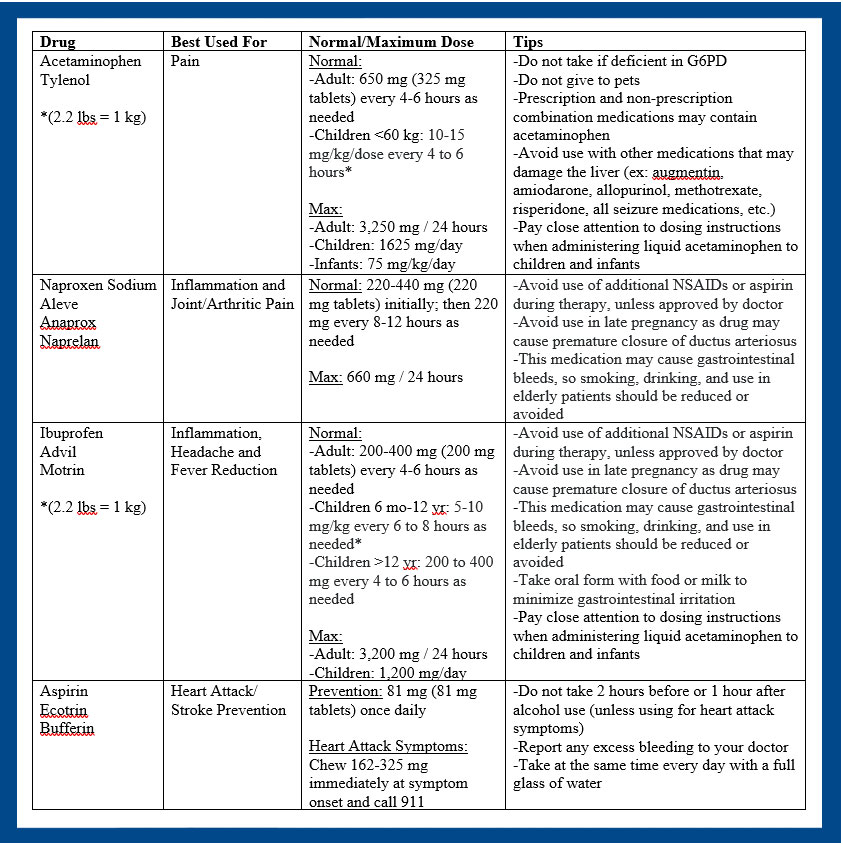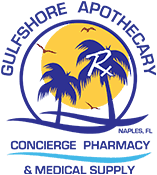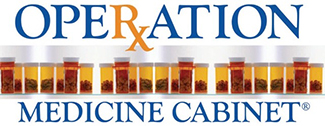Although there is an abundance of over the counter products that can be used for pain relief, we often hear “I’ll just take some Advil, I’ll be fine.” For most cases this is acceptable, but there are more things to look at than just the label that says, “rapid pain relief.” There is a plethora of products that can either be used for their anti-inflammatory properties, their use as a local anesthetic, or as a counterirritant to pain. Each also carries a different mechanism of action that helps to alleviate pain at specific parts of the body. Some of these products have side effects that can easily be avoided and specific directions for use that can prevent further harm to your body.
Oral products that are available over the counter include NSAIDs (non-steroidal anti-inflammatory drugs) such as Aspirin, Ibuprofen (Motrin, Advil), and Naproxen (Aleve), and centrally acting pain relievers such as Acetaminophen (APAP, Tylenol). NSAIDs work by reducing inflammation, pain, redness and temperature that are caused when the body feels “attacked” by a foreign substance or there is apparent damage. Though very similar, even the NSAIDs are very different from each other.
Aspirin inhibits both prostaglandin synthesis (prostaglandins are normally released by your body to defend against foreign substances), to reduce pain and inflammation, and platelet aggregation, which helps to prevent clots. Your doctor should be consulted prior to using this medication due to its effects on blood clotting. Naproxen and Ibuprofen are stronger inhibitors of prostaglandin synthesis, so these are more effective for pain and inflammation reduction than Aspirin. On the other hand, they inhibit platelet aggregation much less than Aspirin. More specifically, Ibuprofen is more effective for general aches, migraines and fever reduction than Naproxen, but Naproxen is better for general inflammation and tendon and arthritic pains. Neither should be used for over 10 days unless instructed by your doctor, because these can be harmful to your kidneys with long-term use. Stomach pain is a common side effect of NSAIDs, but eating before taking this medicine helps to prevent that.
Tylenol tends to work centrally (stops prostaglandin synthesis in the central nervous system) to reduce pain and even increases your pain threshold. This means that it increases the amount of pain you can withstand while having minimal effects on inflammation and no effect on platelet aggregation, so it is utilized in patients that are more apt to bleeding issues. Like NSAIDs, stomach upset is a common side effect that can be avoided by eating prior to taking this medicine. Tylenol should not be used long term, and doses over 3 grams per day should be avoided due to the toxic effects that this has on your liver. Alcohol magnifies the effects of Acetaminophen, so this combination should be avoided. Together, liver toxicity is present even at lower doses. Acetaminophen turns into a toxic substance when metabolized by the body, called NAPQI (N-acetyl-p-benzoquinone imine) and is normally neutralized by G6PD (Glucose 6-Phosphate Dehydrogenase). Dogs and cats, along with patients with known G6PD deficiencies should avoid Tylenol as this may prove harmful for patients and potentially lethal for pets.

https://edrugsearch.com/worst-medications-for-liver/
www.micromedexsolutions.com
http://online.lexi.com.acphs.idm.oclc.org/lco/action/home/switch?siteid=287


